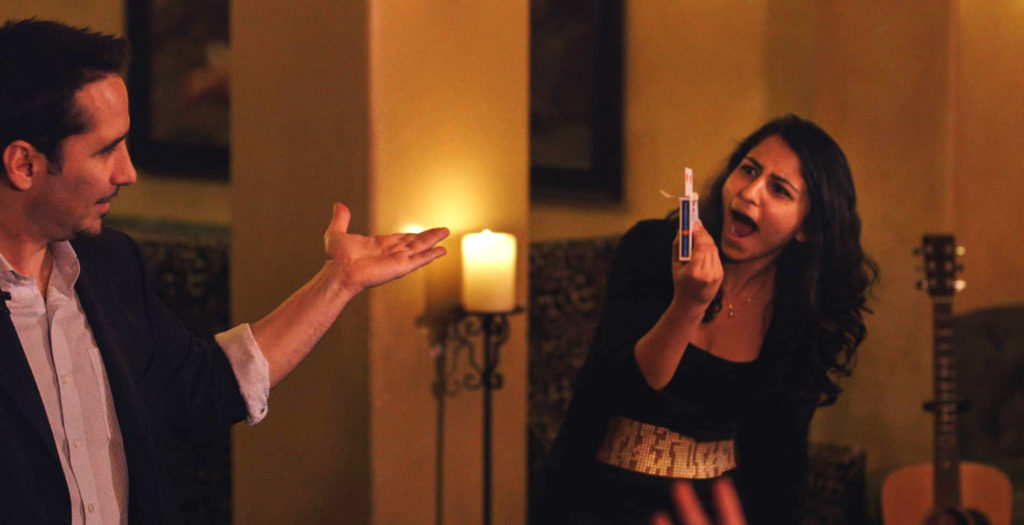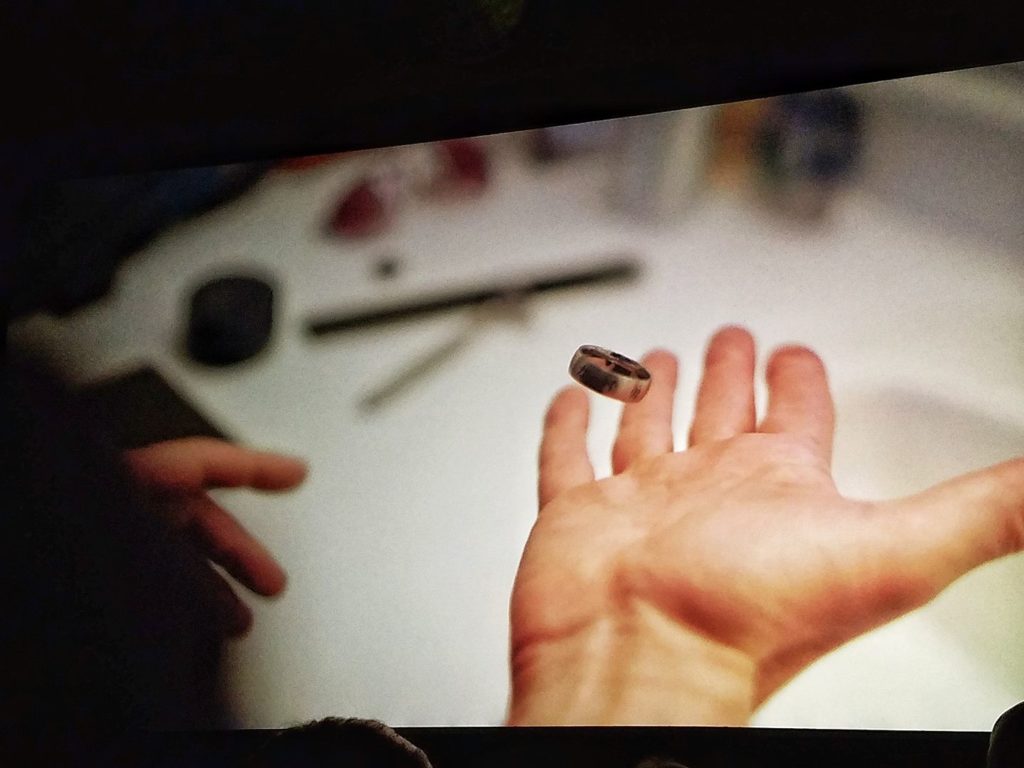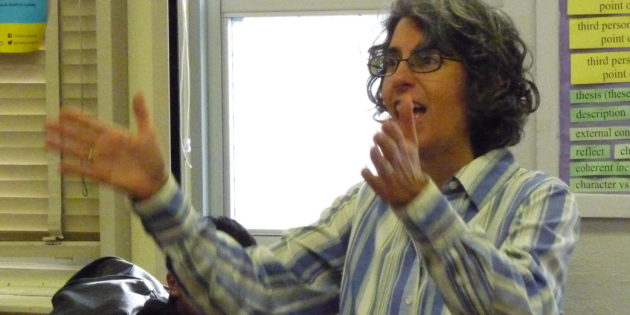Sometimes good teaching looks like magic.
But like many things, it’s the result of intentionality, planning, practice and effort – all things that are invisible to the eye of the student or the classroom visitor.
I spend a lot of time thinking about what goes into good teaching. What might surprise you is that I’ve also been thinking a lot about what goes into good magic.
That’s because my brother, David Minkin, has been a magician for more than 15 years. He is now starring in a documentary about magicians – how they live their lives and practice their craft. It’s called “Magicians: Life in the Impossible.”
There are tricks in the movie that will blow your mind.
But what struck me the most were the parallels in our professional lives. Here are some of the most striking ones.
The Magic of Thinking Big
I’ve come to see my brother as part philosopher, part magician. Certainly, he astounds an audience by bending wine glasses, levitating objects, and restoring playing cards after burning them to bits.
 But David aims to do more than astonish. His magical effects (he does not call them “tricks”) address big themes of life: the passage of time, mortality, relationships, and self-awareness. Each element of his illusions compels audience members to think about what he calls “deep and profound moments” of life. While there is plenty of humor in his performances, he is not a comedian. He’s more focused on making his audience think.
But David aims to do more than astonish. His magical effects (he does not call them “tricks”) address big themes of life: the passage of time, mortality, relationships, and self-awareness. Each element of his illusions compels audience members to think about what he calls “deep and profound moments” of life. While there is plenty of humor in his performances, he is not a comedian. He’s more focused on making his audience think.
In reflecting on his magic, David says “Good magic is heavily distilled. All of the impurities have been removed – the disingenuous jokes and gags, the empty chatter, and the overt seeking of approval by the performer.
“With those elements gone, magic becomes a profoundly moving experience. All that is left is a strong magic effect, and the context in which we frame it.”
While there are plenty of moments of humor in my brother’s show, there is a difference, he says “between a comedy magic show, and a performance of magic that also contains well-placed moments of authentic humor.”
Just as David is philosophical about his magic, the best teachers are philosophers, too. We entertain when it’s required. Comic timing and a sense of humor are great to have up our sleeves. But we who teach are not solely interested in amusing our students or helping them learn our content, be it English, math, art, physical education or any other discipline.
We feel most successful when we help our students understand themselves, the world and their place in it. We want to help our students grapple with life’s big questions, and to develop the tools to pursue meaningful answers to these questions.
Knowing Our Audiences

As a skilled magician, David has to read the room. To effectively respond to a live audience, he monitors people’s moods, their attention, and their level of understanding.
In a memorable (and funny) part of the movie, David has been hired for a bachelorette party on a yacht. By the time he performs, much of his audience had consumed a lot of alcohol. He realizes he has to drastically modify his performance because his audience isn’t sharp enough to understand the nuances of his magic.
“In that situation, I knew the performance I planned was too deep, too artistic and too powerful for them,” David said. “They needed visual eye candy magic that didn’t require them to think too much.” He substituted in a lot of “magical revelations” in a very short period of time. “It’s the kind of magic that keeps a drunk person interested.”
Likewise, to effectively engage our students, teachers constantly read the room. From the moment we greet our students at the door we begin monitoring our students’ “readiness” for learning by asking ourselves questions: What’s on their minds besides school? What is their energy level? How can I make this lesson more effective by leverage their interests and experiences?
Improvising in Class and on Stage
Lesson plans are just that: plans. When class begins, we must be nimble so that we can modify our approach based on our constant monitoring of our students. Though not a typical example, I had to change my lessons plans the day after Donald Trump was elected because I knew my students needed to talk about it.
As a student teacher, I was nervous about my lessons plans and concerned that I would forget something I wanted to say. As a result, I scripted my whole lesson on index cards and was very uncomfortable when the natural flow of the classroom interrupted my plans. Teaching was foreign to me, and I needed cues to help me with the content and the pacing. The notecards didn’t really help me, by the way.
Now, as an experienced teacher, though I may have the same lesson plan for three classes in a row, no two periods are exactly alike. Each group responds to the content differently, has different questions and pacing, and their energy is different.
Similarly, my brother used to his script his whole show – even the jokes.
“I used to be very rigid in the way I presented magic,” he said. “Then I took an improv class. Now I embrace the spontaneous and welcome the gifts of participation. It adds to the show to play off the audience and play off the moment with them and be open to that evening, that audience, and what’s going on with them. It makes it far more interesting for everyone.” As a result, no two shows are exactly alike.
Practice and Persistence

The movie opens with David levitating his ring
Teaching was a second career for me, and did not come easily at first. Although I knew my content area, I was a shy and reserved person. It took me a while to develop the energy to engage a room full of middle school students.
But the art of teaching is an ongoing process of practice and modification, creativity and relationship building with students, refining and refining, and on and on. I was often tempted to quit in my first year of teaching, but somehow, I persisted long enough to begin to get the hang of it and find the joy in it.
Understanding the elements of magic does not make an illusion “work” for an audience. A magician who successfully executes a magical effect in a performance has practiced it hundreds of times, maybe more, before performing it. Making magic look effortless requires countless hours of effort.
Loving magic does not guarantee a successful career in magic; it also requires stamina, bravery, resilience, and a willingness to keep doing it, over and over, despite the challenges.
My brother attributes his success to his love of practice, to the zone he gets in when trying to master a new move or idea.
“I enjoy practicing music and magic for their own sake,” said David, who is also a guitarist. “I’ve never seen practicing as work or as a monotonous task. It has always felt calming and meditative to me. I enjoy breaking things down into tiny components, practicing them for hours, and reassembling them back into a greater picture. And I love those moments when the creative juices get flowing and I begin creating something that has never been done. It’s an adrenaline rush.”
Though magic and teaching are different- a magic show is a one-time experience, while teaching continues with the same students day after day for 10 months- they share some common elements.
The real payoff in good teaching, as in good magic, is knowing that you’ve made a lasting impact, that the experience sticks with people in positive ways.
As the sister of a magician, I am motivated to learn from my brother’s approach to magic. I also wanted to share the wonder of his talents with you, in hopes that you will be both entertained and be inspired to think about life in new ways.
To learn more about David Minkin, or to see him perform live, go to MagicAndWine.com or click the image below. Please let him know you heard about his show from this blog post. He’ll recognize my name. 😉
What’s magical in your teaching? Please leave a comment below.



4 Comments
Michelle Weiner
January 23, 2017Melissa, in describing your magic, you give a beautiful picture of what is looks like to think well about your students. This type of magic teaches them to think well about each other. Along with your subject matter you model compassion….that’s what I call magic.
Melissa
January 29, 2017Ah, what a great comment. Thanks so much.
Stephanie Simon Block
January 31, 2017Beautiful writing, metaphors, and teaching methods! Looking forward to reading the next blog.
Melissa
January 31, 2017Thank you so much for your comment, Stephanie. I really appreciate it.
Leave A Response